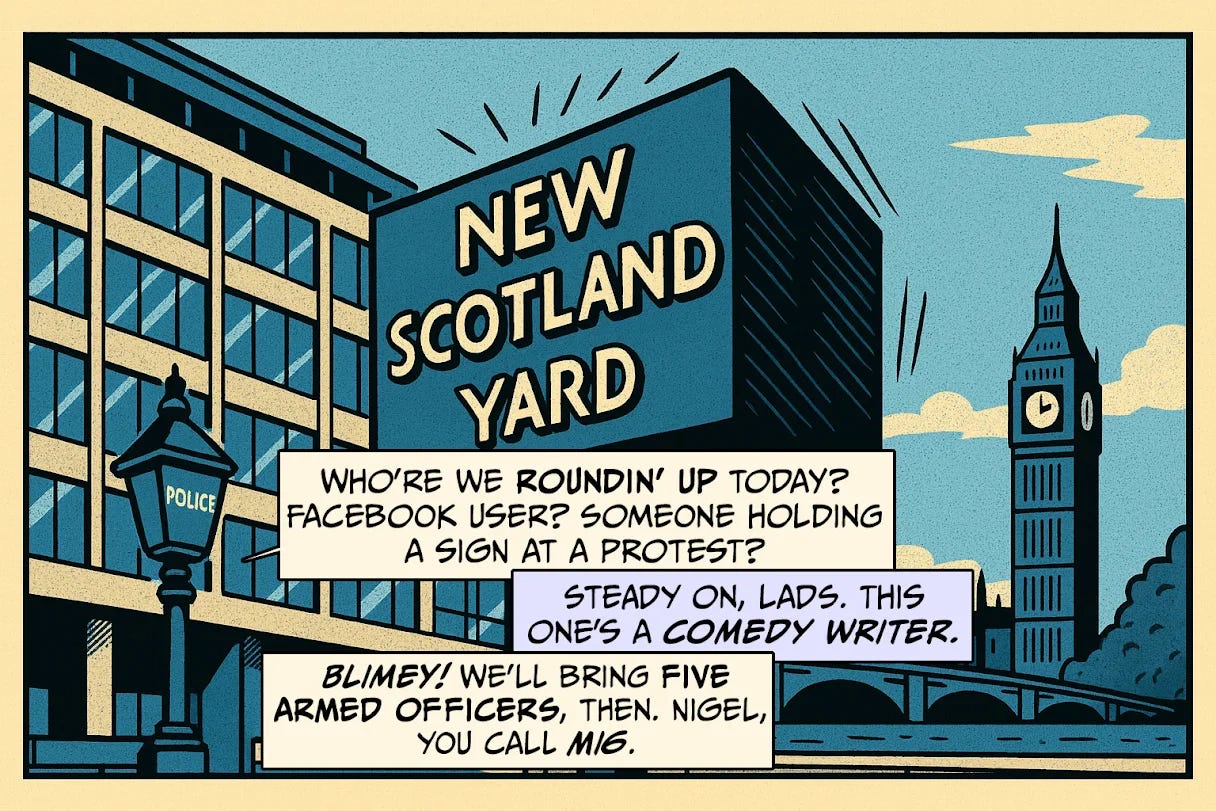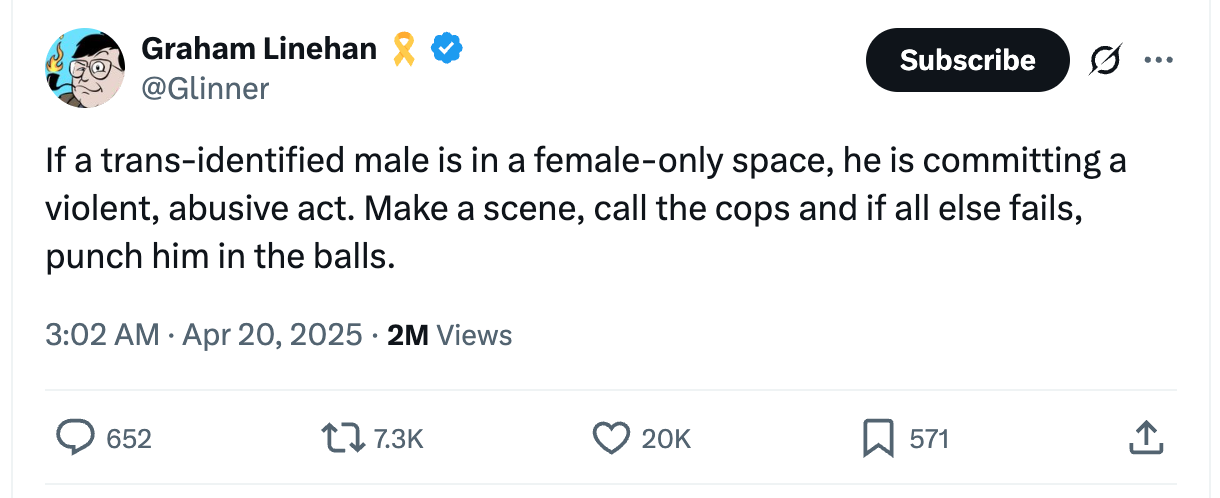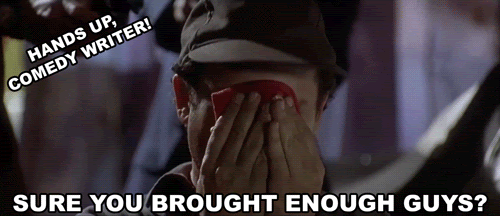Yes, the UK really is that bad for free speech
Graham Linehan’s arrest shines a light on a shameful British problem
Irish comedy writer Graham Linehan was arrested at London’s Heathrow airport on Monday by armed officers. The arrest was over posts he made on social media in April while traveling in the United States. And the justification offered for his arrest was that his posts were “incitement to violence” within the laws of the United Kingdom. Presumably, they’re talking about this in particular:
As should be obvious, this wouldn’t meet the standard for incitement within the U.S.. In the U.S., for something to be incitement, it must be “directed to inciting or producing imminent lawless action and is likely to incite or produce such action.” Linehan is talking about a hypothetical future person in a conditional set of circumstances. It’s hard for something to be imminent when we don’t know where, when, or if it will ever occur.
And we should be skeptical about whether this tweet is “likely to produce” the outcome it suggests. It’s hard to envision a gatekeeping woman in a female-only space saying, “I was going to ignore this person, but then I remembered what the co-creator of Black Books said, so I gave them the Van Damme special.”
We’re not saying there’s a zero-percent chance, but people trying to shoehorn this tweet into American incitement law might be over-estimating Linehan’s influence over women. If Taylor Swift or Oprah said it, maybe, but Graham Linehan?
But the larger point here is that this shouldn’t meet the standard of incitement anywhere.
Linehan’s statement is on par with wishing someone harm, and unless he wants to get cancelled again for revealing his culturally insensitive possession of a magical genie, wishing something doesn’t have any effect in our world of muggles and dull routine.
London’s Metropolitan Police Commissioner, Mark Rowley, seems to agree that Linehan’s arrest was contrary to the best aspirations of liberal society. He publicly called for a review of the speech laws his officers are obliged to enforce — and enforce them they do. British police are making roughly thirty arrests a day for “offensive” or otherwise unlawful online communications.
But we’re seeing a level of denial among Britons about how bad that is. Yesterday, during a BBC interview about the Linehan arrest, Greg said that the U.K. was arresting “about 10,000 people a year for speech since about 2021.” Presenter Annita McVeigh said they would have to “double-check those numbers.”
Greg got those numbers from The Times of London, which, through freedom of information requests, found that arrests for speech offenses had increased from over five and a half thousand in 2017 to nearly 12,500 by 2022.
CAPTION: Not one of my best interviews as I was exhausted from a long day of media hits, but they did cut me off at the end. Oh, the irony! -Greg
Yesterday, The Telegraph reported that, in 2024, arrests for speech offenses hit a new high, topping 13,000 across England and Wales.
So, we’d like to apologize to the people of the United Kingdom for understating the scope of their absolute free expression crisis. And that’s just underestimating the arrests. We’ll talk more about so-called “non-crime hate incidents” later, but remember: the U.K. has already given itself enhanced surveillance powers and an online safety act that functionally restrains anonymous speech (unless you play Death Stranding, possibly).
Authoritarian governments keep their populations in check by visiting consequences on a small portion of their population and watching the effects reverberate; a single arrest might chill the speech of millions. By the end of 2023, based on the numbers in The Times, the U.K. had accomplished nearly 66,000 arrests for speech.
Ms. McVeigh then raised a second point with Greg: Isn’t it hypocritical for the U.S., which has its own speech problems, to point the finger at the U.K.? To which we’d answer, first, that’s not an argument — it’s a way of distracting from an argument — and second… no, not really.
Yes, the U.S. has censorship problems. We of all people should know; FIRE is fighting those forms of censorship every day. That’s also how we know that there is an order of magnitude of difference between the speech problems in the U.S. and the scale of those problems in the U.K.
Exact numbers are hard to come by, but the U.S. probably arrests enough people for speech every year to fill three or four professional soccer — sorry . . . football — team rosters. Meanwhile, at a fraction of our size, the U.K. arrested enough people last year to fill a small premier league stadium. Perhaps it’s hypocritical of the politicians perpetrating American censorship to point out British censorship, but as for us and FIRE, we oppose both, all the time.
Far be it from us to resort to algebra (long the refuge of scoundrels), but 13,000 people in an estimated 61.8 million people in England and Wales means that if the U.S. wanted to keep pace, we would have to arrest about 71,500 people for their speech every year. (That’s over half the capacity of the American federal prison system, so we’d really need states to step up and do their part to keep America fascist!) We would need to top 1,430 speech arrests per state just to keep pace with the U.K.’s per capita rate from 2024.
America isn’t going to do that. We don’t want to do that — because the entire reason so many Americans react so strongly when the government detains a student for her speech, or students get arrested at a protest, or a social media site shadowbans dissenting viewpoints, is because, even when we’re at each others’ throats over political differences that seem impossible to bridge, we’re united by one thing: We deeply, desperately, instinctively don’t want to live in a society like the one the U.K. has created.
We would like to believe we are this way because whenever an American is confronted with heavy-handed government speech restraints, our DNA rejects it, denatures, and arranges itself into protective stars-and-stripes protein chains. But that can’t be true, because so many British citizens also reject this anti-liberty censorship.
And the hems of the apron on their nanny state are fraying.
In May, London’s Court of Appeal rejected the Home Office’s defense of rules, enacted under a prior government, that lowered the threshold for police to “impose conditions” on protesters. In 2021 the court ruled that the chilling effect created by police visiting someone at work over allegedly transphobic tweets “must not be underestimated. To do so would be to undervalue a cardinal democratic freedom. In this country we have never had a Cheka, a Gestapo or a Stasi. We have never lived in an Orwellian society.” In Glasgow, a street preacher won damages from police who had arrested him for “breach of the peace with homophobic aggravation” for reciting bible quotes.
The Telegraph has more intolerable anecdotes that surely would make even the stiffest upper lip quiver. A retired constable handcuffed and interrogated by members of the police force he’d served for a tweet warning about anti-Semitism. A Catholic woman enduring three investigations for silently praying outside abortion clinics. Parents arrested in front of their three-year-old and investigated for weeks over criticism of their daughter’s school in a private WhatsApp group.
U.K. police are flat-out telling people “being offensive is an offence.” But offensive to whom?
The nature of police-enforced speech restraint is that the police get to decide what’s offensive. And we know what they find offensive. A man who burned a Quran in protest offended them. An activist for democracy in Hong Kong offended the police so much she was made to sign an agreement promising to “cease any activity that is likely to put [her] at risk.” Six girls at a Quaker meeting house offended the police enough to be arrested for “suspicion of conspiracy to cause a public nuisance.” (In other words, they were going to talk about protesting. Pity, really, they couldn’t be arrested a few days earlier, when they were probably thinking about scheduling a meeting to attend to talk about protesting. Honestly it’d be safer if we just clamped the newborns in irons, wouldn’t it?)
In some ways, the over-policing of speech is inevitable result of the British practice of recording “non-crime hate incidents” — that is, government logging of lawful activity or expression someone else perceives as hateful. This includes, as The Guardian reported, refusing to shake hands or giving a bad haircut. FIRE has seen systems like this on campus, generically called bias reporting systems, lead to similarly absurd abuses of authority. As ERI’s own Angel Eduardo has written:
These initiatives incentivize and in many cases encourage people to report each other for disfavored expression. As you can imagine, these systems often lead to unconstitutional infringements on protected student and faculty speech and chill expression on campus.
For example, after the University of California, San Diego received bias incident reports about a student humor publication that satirized “safe spaces,” administrators asked the university’s lawyer to “think creatively” about how to address the newspaper, which they felt “crosse[d] the ‘free speech’ line.” And at Connecticut College, pro-Palestinian students were reported for flyers mimicking Israeli eviction notices to Palestinians, prompting an investigation by a dean.
The U.K. has done exactly what FIRE has been trying to get universities to stop doing, and convince American states not to do: use complaint-driven policing to create shadow records that chill speakers and form the basis of eventual illiberal prosecutions. Maybe that’s something we need to change in our messaging; if potentially becoming an illiberal college campus doesn’t frighten states, maybe potentially turning British will.
Could the U.S. do something dumb tomorrow? Yes. But it almost certainly couldn’t be as dumb as arresting Linehan was, because the First Amendment prohibits arresting people for having ideas we don’t like. All hate speech is, really, is speech that we personally find hateful — and the U.K. has come to discover that we don’t all hate the same things, or hate them in the same ways.
If something like the arrest of Linehan did happen here, FIRE would fight like hell, and almost certainly win that case. And we believe that America, with its powerful free speech culture, would not accept it.
We have a great deal of love for the U.K.. John Cleese lives there, and he’s one of our favorite people. Without Terry Pratchett and the Discworld books, what would fantasy writing look like? It’s the birthplace of John Stuart Mill, a free speech hero whose On Liberty remains one of the most enduring arguments for free speech. Also, Greg’s mother is British, and without her he would entirely cease to exist — which would dramatically and irreparably reduce his speaking availability. (What would become of his t-shirt collection? Will no one think of the screen printers?)
It is because of that affection that we can’t pretend the U.K.’s turn toward state control of speech is an acceptable interpretation of Western democracy. It isn’t. It’s wrong and incompatible with a free society.
Before you hand-wave this criticism away because, “Oh, you know, those yanks and their bonkers First Amendment,” we’d like to leave you with this thought to consider: We don’t expect you to suddenly love the First Amendment. But we do expect you to recognize that it enshrines a vision of liberty that, at least broadly, we have shared through the last century. The First Amendment is our mechanism for ever reaching toward that liberty. Whatever your mechanism was — identity, culture, pride, civic duty — it seems to have gone missing. And we desperately wish you’d find it again.
SHOT FOR THE ROAD
Well, it’s that time of year again! Keep your eyes peeled on Tuesday for the launch of FIRE’s 2026 College Free Speech Rankings. This year, we surveyed 68,150 students — making it the largest-ever survey of student attitudes toward free speech — in order to rank 257 colleges and universities. You’ll see some familiar names in the top (and bottom!) 10, but there were also some surprises. That’s all I’ll say for now, but keep an eye out on Tuesday and register for Wednesday’s FIRE webinar to dig into the results!







It seems UK defines hate speech differently depending on who incites. Some people are allowed to incite while others aren't- kind of like US universities.
Thank heavens that I don’t live in the UK. The fact that freedom of speech is held in such low esteem there is a clear sign that they are acting out of fear instead of principle when it comes to maintaining a free society.